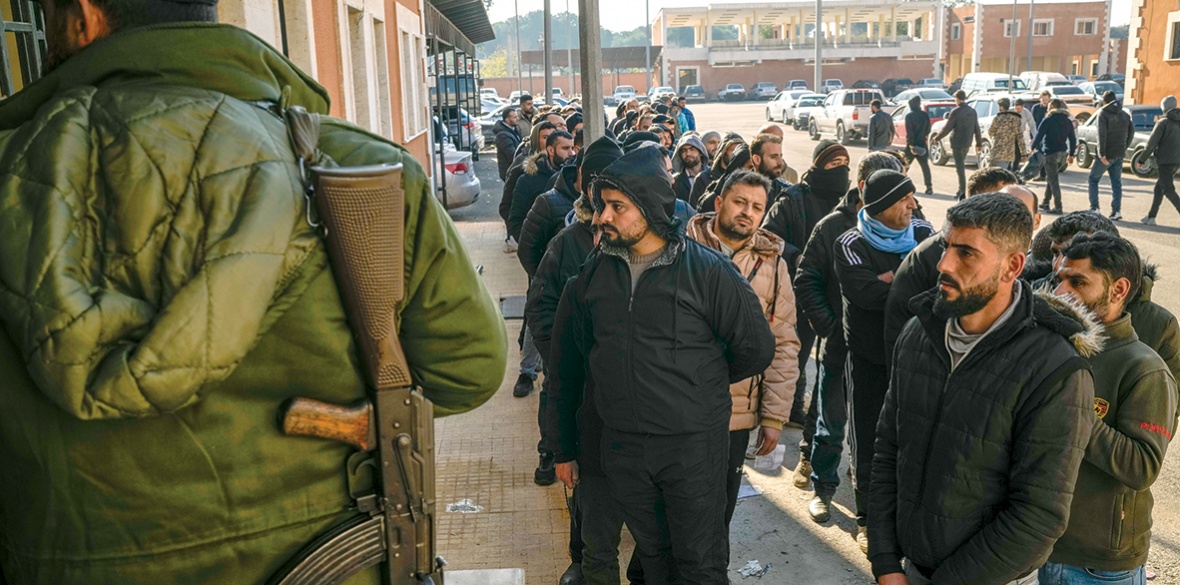This is the last article you can read this month
You can read more article this month
You can read more articles this month
Sorry your limit is up for this month
Reset on:
Please help support the Morning Star by subscribing here
LIBERATION today reiterates its recent call that the future of Syria must be decided by the people of Syria alone and not by external forces with their own agenda for the country and its people.
The rapid advance of Hayat Tahrir al-Sham (HTS), as well as other armed factions, that led to the quick disintegration and fall of Bashar al-Assad’s husk of a government in Syria might have taken the world by surprise — but it should be viewed as part and parcel of a wider, long, and ongoing process to change the balance of forces in the Middle East.
By the point of the collapse of Assad’s government, Syria had essentially been divided into three zones after the civil war that began in 2011. Assad’s government was in control of only 65 per cent of the country’s sovereign territory.
It was supported chiefly by Russia and the Islamic Republic of Iran, which helped the government in Damascus to hold the territory under its control as well as repel attacks from various opposition militant groups.
The second zone, comprising 25 per cent of Syrian territory, is controlled by the largely Kurdish Syrian Democratic Forces (SDF) with the backing of the US.
The north-western regions of the country, including Idlib Governorate, are controlled by Hayat Tahrir al-Sham (HTS). This group emerged from the dissolved Jabhat al-Nusra, which was an Al-Qaida affiliate. The group’s leader Abu Mohammed al-Julani (Ahmed Hussein al-Sharaa), a longtime Jihadi militant, only renounced ties with Al-Qaida in 2016 — claiming he did so to deprive the West of reasons to attack his organisation.
While designated as a terrorist organisation by the UN, US, Russia and Turkey, HTS has nonetheless enjoyed continued covert backing from governments that were opposed to Assad — ironically including Turkey.
HTS has actively and extensively regrouped its forces over the past year, laying the ground for its recent offensive. This was boosted by a parallel attack led by another militant group, the Syrian National Army (SNA), backed by Turkey, which is based in the areas around the border between the two countries.
Immediately following the fall of Assad, Israel intensified its attacks on Syria, which had been taking place throughout the past year at a lower intensity.
Israel carried out around 500 aerial strikes in the 48 hours on December 10-11— more than the total it has carried out in the past year combined. Israel spuriously claims that this intensity is to ensure that Syrian arms and ammunition do not fall into the militants’ hands.
However, the objective of extremists in the Netanyahu regime to assert and project the notion of a Greater Israel, one whose strength and sphere of control extends well beyond its recognised international borders, is well-known — and the destabilisation and weakening of a neighbouring country like Syria serves only to further this malign aim.
During the HTS offensive towards Damascus, Israel also moved to occupy the UN buffer zone between the Golan Heights, which it illegally annexed from Syria in June 1967, and the rest of Syria’s sovereign territory.
Israel subsequently declared that its forces had then crossed from the buffer zone into southern Syria, all in flagrant violation of UN resolutions pertaining to this border and the Golan Heights as well as international law.
Meanwhile, there is also concern that in the north of Syria, Turkey is keen to re-establish its control of this area and reassert its regional ambitions. In supporting the SNA to carry out attacks on the SDF and occupy land hitherto under the latter’s control, Turkey seeks to break and eliminate any projection of Kurdish administration or control in the area.
The SDF’s capturing of the principal eastern city of Deir ez-Zor, as well as the significant extension of their control to Abu Kamal and the Iraqi border, following the Syrian army’s rapid abandonment of its positions there, will be unpalatable for most of the Syrian rebel factions and Turkey, and is unlikely to be tolerated by them in the longer term.
HTS has announced the formation of an interim government with Mohammed al-Bashir in place as Prime Minister until March 1 2025. He has urged the Syrian people to remain united and promised to govern accordingly.
However, given the experiences of countries or regions governed by militant groups like HTS, as well as the impact of foreign interventions in Iraq, Afghanistan, and Libya in recent years, such assurances simply cannot be taken at face value.
Liberation remains deeply concerned that the secular and representative framework for governance in Syria — vital given the country’s complex makeup and dynamics — will be gravely undermined, if not done away with completely, by a patchwork of Islamist militias within the country, with any process for democratic transition imperilled by the various foreign forces already actively engaged in intervention in Syria.
Liberation repeats its view that the future of Syria should be decided by the people of Syria — and only them — without any external influence, intervention, or threat.
Liberation is an internationalist human rights organisation founded in 1954 as the Movement for Colonial Freedom — Liberationorg.co.uk.







